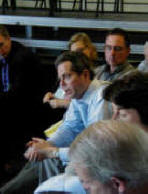North America: Programs and Resources
PROGRAMS
The Leaders Forums in North America take participants to meet with leaders in business, the public sector, education, healthcare, science, technology, art, music and society. With the objective of understanding some of the unique challenges of this developed economy and society and the implications it has for the rest of the world, participants also gain insight into the legacy and alternative future scenarios for western civilization.
American global corporations have been successful competitors worldwide. Do they compete differently? How?
How have American companies adjust to economic downturns? Is it different than in other parts of the world? What can be learned from how they companies compete that can be applied to other organizations? How do they innovate and create new ideas and solve problems?
What clues are there in history and culture that help us to understand why Americans view opportunities and challenges the way that they do and act as such? What can we learn from history that will inform our course for the future?
As a political and economic force in the world, the U.S. is expected by many to demonstrate leadership in ensuring economic progress and political stability. At the same time, it is questioned for the ideological "liberties" and policies it has pursued as a global superpower in Iraq and elsewhere. Most U.S. citizens are not concerned with taking care of the rest of the world and question the decisions to allocate so much of their own resources to solving others' problems. Yet at the same time, they are willing to support ambitious efforts that appear to ensure their own safety and security at great cost.
What does this mean for the future of the U.S. role in the world? Emerging centers of power around the world hold the potential to challenge the U.S. value-system and position of strength. What will become of the U.S.- China relationship? What of Europe and the U.S.? What of the relationship between Islamic extremists and western civilization as a whole?
Environmental policies along with debates on human rights and the position of the U.S. on capital punishment and treatment of suspected terrorists which seems to contradict a platform for human rights - places the U.S. in a precarious and uncertain position with respect to its image and integrity. At the same time, the discussion and partial acceptance of elements of the Anglo-American model of shareholder capitalism round the world, implies a half hearted acceptance of the American legal and social systems as well.
What new models of political economy and role of the corporation will now emerge around the world? What will be the role of the U.S. as leader in the world in the future and what will this mean for the global corporation? Will there be a shift in power and where will it come from?
During this Forum, participants explore leadership in times of great change and leadership in a global environment. A critical component of the leadership experience is to also become familiar with what leaders in non-business enterprises are doing and how they are solving enormous challenges in society.
Examples of these types of leadership examples have included Lily Yeh of Village of Arts and Humanities and Mimi Silbert of Delancey Street
As part of the Forum experience, participants meet and exchange ideas with these leaders and consider the following questions or themes:
|
The Changing World Around Us: What do we, as leaders, need to be thinking about as we think about the world in which we operate and how is it changing? | |
|
Challenges and Opportunities in Leading the Global Corporation: What have other organization done and how have they succeeded or failed? What can be learned from their experiences? | |
|
Leadership Challenge: How does the individual, as leader, prepare for and lead effectively in times of great change and ambiguity? | |
|
Lessons from History and Culture: What can be learned from a country’s history, music and culture that provide insight into the underlying values, judgments and behaviors of people? |
 |

RESOURCES
People
The Resource people of The International Forum in North America include the many people who have been involved with our programs since 1989. They include experts from business, politics, art, music, history, religious thought, science, society and culture. To view a list of some of these resource people click here.
Suggested Articles and Readings
The following list are articles and readings which have been provided as
background materials to the learning experiences in North America:
Success that Lasts by Laura Nash and Howard Stevenson, Harvard Business Review, February 2004, single minded focus is a great way to achieve some goals, but is it really the secret to long term success? This article outlines some interesting findings from recent research.
The New Rome Meets the New Barbarians, by Joseph Nye, March 2002, The Economist, The United States is likely to be the world's top power for many years. This brings challenges that it should not try to face alone, writes the author in this editorial from The Economist
The Internet and the Global Corporation - Agenda Book, San Francisco 2001
The Clash of Civilizations, by Samuel P. Huntington
Corporate Sovereignty, by Charles Handy
The Governance of the Corporation, an excerpt from Management Challenges for the 21st Century, By Peter F. Drucker
The Social Responsibility of Business is to Create Profits, by Milton Friedman
The Earth's Second Chance, by Kofi Annan
Corporations in Society by Kazuo Inamori
North American Forum - Agenda Book, Philadelphia 2001
Corporate Social Responsibility, by T. Franklin Harris Jr.